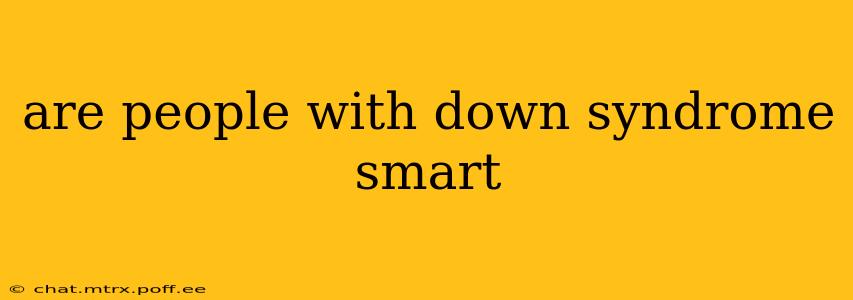Are People with Down Syndrome Smart? Reframing the Question of Intelligence
The question, "Are people with Down syndrome smart?" is framed incorrectly. It implies a simple yes or no answer to a complex issue regarding cognitive abilities and intelligence. Instead of focusing on a singular definition of "smart," it's more accurate and respectful to explore the diverse cognitive profiles and capabilities of individuals with Down syndrome.
Down syndrome is a genetic condition affecting chromosome 21, resulting in varying degrees of intellectual disability. However, intelligence is far more nuanced than a single IQ score. It encompasses a wide range of abilities, including problem-solving, creativity, social skills, and emotional intelligence. Many individuals with Down syndrome demonstrate exceptional strengths in specific areas.
What are the typical cognitive characteristics of individuals with Down Syndrome?
Individuals with Down syndrome often exhibit:
- Varied levels of intellectual disability: The level of intellectual disability can range from mild to severe, with the majority falling within the mild to moderate range. This means their cognitive development progresses at a slower pace than their typically developing peers.
- Strengths in certain areas: While some cognitive skills may develop more slowly, many individuals with Down syndrome demonstrate remarkable abilities in areas like memory (especially visual memory), social skills, and artistic expression. They often possess a warm and friendly nature.
- Individual differences: It’s crucial to remember that each person with Down syndrome is an individual with a unique personality, strengths, and challenges. Generalizing their cognitive abilities is inaccurate and unhelpful.
How does learning and development differ for individuals with Down Syndrome?
Learning and development for individuals with Down syndrome often requires:
- Early intervention: Early intervention programs, beginning in infancy, can significantly improve cognitive and developmental outcomes. These programs typically focus on speech therapy, physical therapy, and occupational therapy.
- Individualized education programs (IEPs): Tailored educational approaches cater to individual learning styles and needs, ensuring optimal progress.
- Supportive environment: A supportive and inclusive environment at home, school, and within the community is crucial for fostering independence and self-esteem.
What are some common misconceptions about intelligence and Down Syndrome?
Several misconceptions surround the intelligence of individuals with Down syndrome:
- Limited potential: Many believe that individuals with Down syndrome have severely limited potential. However, with the right support and opportunities, they can achieve significant milestones in their education, employment, and personal lives.
- Uniformity: The assumption that all individuals with Down syndrome share the same cognitive abilities is incorrect. There is significant variation in their cognitive profiles.
- Lack of independence: While some individuals may require more support, many can achieve a high level of independence with appropriate assistance and training.
Do people with Down syndrome have different learning styles?
Yes, like any population, individuals with Down syndrome exhibit diverse learning styles. Some may excel with visual aids, while others may respond better to hands-on activities or auditory learning. Effective teaching strategies must be individualized to account for these variations.
Can people with Down syndrome attend mainstream schools?
Inclusion in mainstream schools is becoming increasingly common and beneficial for many individuals with Down syndrome. With appropriate support services, they can thrive in inclusive learning environments and benefit from interaction with their typically developing peers.
In conclusion, focusing on a person's individual strengths, needs, and potential is far more meaningful than a simplistic assessment of their "smartness." Individuals with Down syndrome demonstrate a vast spectrum of abilities and, with the right support, can lead fulfilling and successful lives. The key is to embrace inclusivity, celebrate individual differences, and challenge outdated perceptions.
